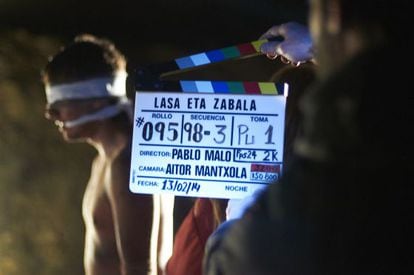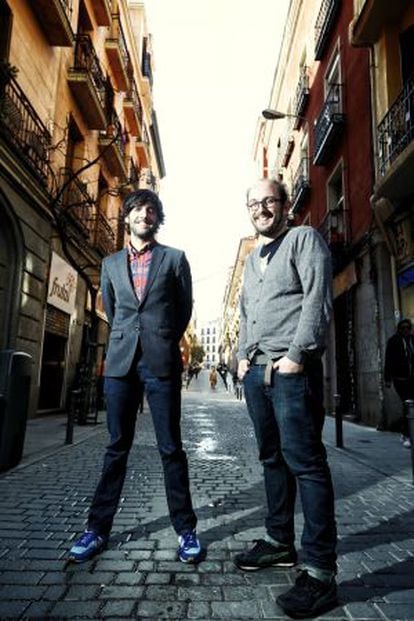Is it time to start laughing about ETA?
Recent Spanish movie projects are confronting the Basque troubles in a more open way


In Chris Morris’s Four Lions (2010), four inept jihadist terrorists train to commit a horrific attack at the London Marathon. At once savage and firmly rooted in current events, the film was also a comedy. “Four Lions was another demonstration of the maturity of a country like the United Kingdom and its cinema, something we are still a long way away from,” says writer and director Borja Cobeaga. It was from his mind — and that of writing partner Diego San José — that the best sketches for Basque TV comedy series Vaya semanita came, as well as the script for Emilio Martínez-Lázaro’s Ocho apellidos vascos, which broke Spanish box-office records after its release last Friday. The film deals with the culture clash between Andalusians and Basques and is thus full of gags about kidnappings, views on the ETA ceasefire in Seville and kale borroka street violence.
Cobeaga and San José had gone even further in Vaya semanita, as well as in another script that remains in limbo, Fe de etarras, whose departure point is: what would happen if an ETA cell hiding out in a safe house found themselves in charge of their apartment building’s residents association? And, what’s more, during a period coinciding with Spain winning the 2010 World Cup...
In San José’s view you can always go further: “Vaya semanita showed us that people are much more prepared than we thought. We considered, shyly, that it might offend people, but the public surprised us.”
It is fair to say, though, that ETA still frightens Spanish cinema. The script for Fe de etarras passed through the offices of Telecinco Cinema, the production company, owned by TV group Mediaset, behind Ocho apellidos vascos. “Bearing in mind that the idea behind the film is very funny, it is still a thorny topic, and you have to be 200-percent sure before getting involved in the venture,” says Telecinco cinema head Álvaro Augustín.

What is true is that film and TV tends to be treated very differently from other forms of culture and entertainment: there lies the success of Jordi Galcerán’s play Burundanga, in which a group of friends discovers that one of them is a member of ETA. “Sooner or later a film like Fe de erratas will have to be made,” says Augustín.
Before that can happen, Cobeaga will be shooting a comedy this summer – to be called either El negociador (or, The negotiator) or El problema número uno (or, The number one problem) – based on the negotiations between former Basque Socialist Party president Jesús Eguiguren and ETA in 2005 and 2006. “It basically goes through what happens away from the negotiating table. For example, Eguiguren couldn’t carry credit cards, to prevent people knowing where he was, and he lived off kebabs and sandwiches; or how the Mediation Center confused him with an ETA member because of how he was dressed.”
Though ETA has yet to provide much material for comedies, it has done so for thrillers. Last Friday director Pablo Malo finished filming Lasa y Zabala, a political thriller based on the first assassination carried out by the government’s GAL anti-terrorist death squads, in the Basque Country. And this Monday Luis Marías began filming Fuego, which stars José Coronado as a police officer looking for revenge 11 years after a bomb killed his wife and left his daughter without legs.
“I have never had problems as an actor,” says Coronado, who is probably the non-Basque performer who has starred in the most films about terrorism, including Todos estamos invitados, GAL, El lobo and No habrá paz para los malvados (about Islamist terrorism). “I remember the tension when we were shooting Todos estamos invitados in the university, where I played a lecturer under threat. The time has come to make films about the subject without risk of division. The general public is now ready.”
Now is the time to make films about the subject without risking division,” says José Coronado
There are more than 40 Spanish films about ETA, including Helena Taberna’s Yoyes; Gillo Pontecorvo’s Ogro; Emilio Martínez-Lázaro’s La voz de su amo; Montxo Armendáriz’s 27 horas; Mario Camus’ Sombras en una batalla; Antonio Hens’ Clandestinos and Jaime Rosales’ Bullet in the Head. And those are just the fiction works.
“There have been a lot of films about ETA, and even more documentaries, but we still have the brakes on,” says producer, director and ex-ETA member Ángel Amigo, a key figure in Basque cinema with works such as La fuga de Segovia (1981), Ander eta Yul (1988) and El cazador de dragones (2011) behind him. “A time of more freedom is opening up following the end of the armed struggle: before, in a place as small as the Basque Country, you could have a lot of problems with [ETA’s] backers. Today the problems come from the authorities. It is also true that in every period the political and social situation, which was always changing, affected cinema in a very different way in terms of the topics you touched on and how you did so.
“It is very important that we understand that generations pass and the perception that each person has of ETA changes. I don’t feel ready to make a comedy about ETA; the fact that Cobeaga and San José can is simply a generational change, and it piques my curiosity,” Amigo concludes.
More information











































